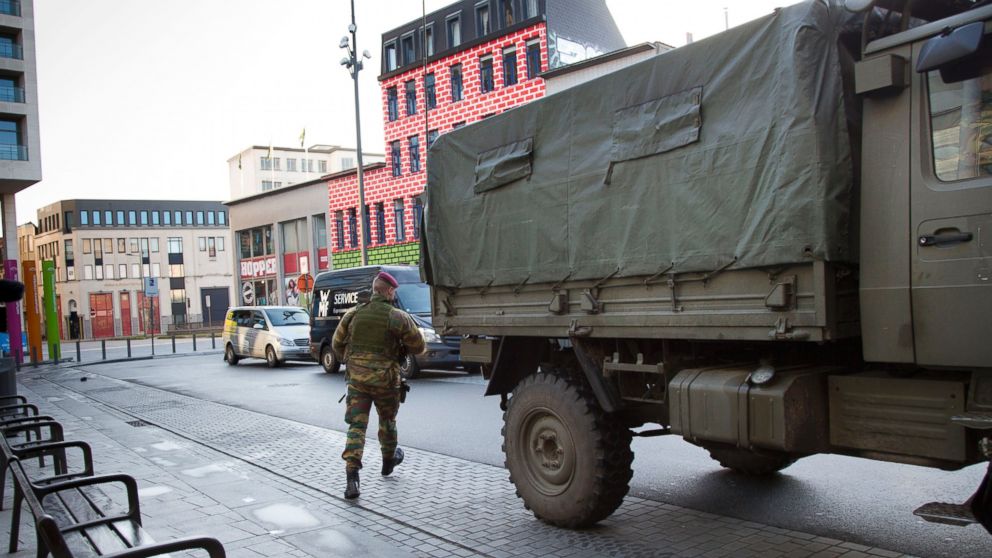Europe on High Alert After Terror Sweeps
Thousands of officers are deployed.

— -- Nations across Europe remained on alert Saturday, deploying thousands of officers following terror sweepe by law enforcement agencies in the wake of last week’s deadly attack in Paris. In Greece, four suspected terrorists have been arrested, news agencies reported.
Up to 300 soldiers will be deployed starting today in the streets of Brussels and Antwerp, and possibly other areas, a spokesman for the interior ministry confirmed. A statement after a late night meeting Friday says their role is to watch various sites and back up the police.
Brussels police confirmed to ABC News that 14 local police stations would be closed during the night, which is thought to be a precautionary measure in the event of an attack. Belgian policed carrying out 12 raids Thursday afternoon and evening because attacks against police officers were planned for Friday, according to EU counter-terrorism coordinator Gilles de Kerchove. Belgian authorities have described the foiled plot as “very imminent.”
In Greece, a police source told the Associated Press that they have detained four suspected terrorists, including one who could be the man wanted by Belgian authorities as an alleged ringleader of a jihadi cell. The source spoke on condition of anonymity because the person was not officially authorized to comment on an ongoing investigation.
The person told the AP that the four were arrested Saturday, including one who "matches the description" of Abdelhamid Abaaoud -- the man who Belgian authorities suspect was the mastermind behind a dismantled jihadi cell there. Greek police have sent photos, fingerprints and DNA material to Belgium and are waiting to see whether the person is indeed Abaaoud, the source said.
In the UK, after attacks on police in Europe in recent days, officials raised the threat level for police officers across Britain to severe – the highest level it has ever been. It means an attack is “highly likely.” Police in London say they also have "heightened concern” about the risk to the Jewish community in the UK.
“In addition to our existing security measures, we are in dialogue with Jewish Community leaders about further actions that we will be taking, including more patrols in key areas,” said Mark Rowley, assistant police commissioner. “We have to be incredibly vigilant and look at all of these risks, particularly risks to police officers themselves and take every action that we can.”
The head of Europol, Rob Wainwright, told the BBC that the need for tightened security across Europe highlighted the complex nature of the terrorist threat in the region. "We're dealing with multiple thousands of potential terrorists," he told the BBC World Service. He said it was hard for police to identify plans because suspects were "working in a self-radicalised way very often, not necessarily under any command and control structure."
The moves came a week after 17 people were killed in dual terrorist attacks in Paris and a day after Belgian police killed two people in widespread counter-terrorism operations there.
France remains on its highest terrorism alert level and authorities have said that some 120,000 police and soldiers have been mobilized across France.
One of Europe’s top counter-terrorism officials said yesterday that it’s impossible to guarantee 100 percent security and that other attacks could follow last week’s incidents in Paris.
“I don’t have a crystal ball,” Gilles de Kerchove, Counter-Terrorism Coordinator for the European Union, told ABC News of the possibility of future attacks. “But the message I want to send is a bit different from the U.S. because in a way after 9/11… the expectation of the American citizen is they want 100 percent security. I think [Europe] is a bit more resolute and accepts that there is nothing like 100 percent security. You have to accept some risk in society.”
Europe has long feared that citizens either inspired by groups like al Qaeda and ISIS, or who have fought alongside them, would carry out attacks. But Kerchove denied the Paris attacks represented the beginning of a new era.
"I think we know [attacks] may happen. Some plots have been foiled, some networks have been dismantled in France and the UK, in Germany, and therefore people are pretty effective, but you don’t win 100 percent,” he said. “So, to say that it’s a game change, no. I think it’s just reinforced, we need to go deeper and quicker..."
One strategy Kerchove pushed European governments to consider is not sending all those returning to Europe from battlefields in Syria or Iraq to prison where they could meet other, hardened jihadists.
“We know too much how prisons are major incubators of [extremism],” he said.
In the case of the Paris attacks, the gunmen in each assault had spent time in prison together and with other radical figures, an investigation after the attack found.
Rather, Kerchove said disengagement or rehab-like programs could be the answer.
“We will tackle the problem in a significant way, but it is a challenge,” he said.
Kerchove also said he feared that beyond the normal motivations for terrorist attacks, a new one may be spurring the major terror groups of today: competition. In recent months a terror group called the Islamic State of Iraq and Syria (ISIS) captured headlines the world over for their barbaric actions in the Middle East, overshadowing their once-parent organization al Qaeda. Attacks such as the one in Paris, Kerchove said, could be an attempt by al Qaeda to show it’s “still relevant.”
ABC News' Lee Ferran contributed to this report.




